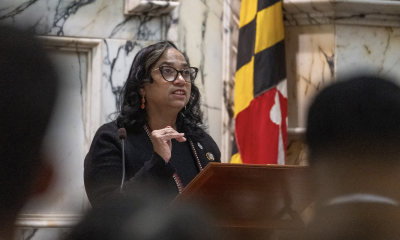Opinions
Madaleno for governor of Maryland
No other candidate has such a strong record of leadership and achievement


State Sen. Rich Madaleno is running to unseat Maryland Gov. Larry Hogan. (Washington Blade photo by Michael Key)
According to Wikipedia Richard S. Madaleno Jr. is an “American politician from Maryland. A Democrat, he is a member of the Maryland State Senate, representing the state’s 18th district in Montgomery County, which includes Wheaton and Kensington, as well as parts of Silver Spring, Bethesda and Chevy Chase. Madaleno served as chair of the Montgomery County Senate Delegation from 2008-2011. He previously served four years in the House of Delegates. Growing up in Silver Spring, Madaleno was educated in Montgomery County public schools and Georgetown Preparatory School. He then went to Syracuse University where he earned a BA in 1987 and an MPA in 1989. He and his husband Mark and their two children live in Kensington.”
So now you know the basics. Impressive but maybe not enough to get your vote. But this only scratches the surface of Madaleno’s achievements. He is much more than a local boy who made good. He is one of the hardest working legislators, a decent and honest man, who has made a career of fighting for all Marylanders.
Rich worked hard to become one of the most knowledgeable people on how Maryland government works. He began working for the Maryland General Assembly’s Department of Fiscal Services as a Senior Analyst for the House Appropriations Committee. There is no better way to learn about government than understanding the budget. The Washington Post said about Rich, “He is an expert in tax and budget matters.”
Before running for the legislature he worked in Montgomery County’s Office of Intergovernmental Relations. So in addition to his budget expertise, Rich learned early how what happens in Annapolis and Washington, D.C. impacts every county and every individual in Maryland.
Rich’s record of success makes all Marylanders proud. He led in the fight for freedom to marry and to combat discrimination in housing and employment. He has a progressive record of achievement in human rights, voting rights and social justice. Rich is proud of having sponsored the law prohibiting discrimination in public accommodations, housing and employment based on gender identity, and co-sponsoring the law requiring equal pay for equal work. When Republicans in Congress threatened to terminate federal funding for Planned Parenthood in 2017, Rich led the fight and sponsored the law ensuring that the broad range of health care services provided by Planned Parenthood clinics to women in communities across Maryland would continue to be funded. He co-sponsored the bill allowing counties to enact public financing for county elections and co-sponsored the law to increase the number of early voting centers. He fought back against Hogan appointees to ensure those centers were not eliminated by the Hogan administration in populous parts of Montgomery County.
On education, Rich has taken critical action to build high-quality, affordable public education. He spearheaded initiatives that improved education in Maryland at every level, from Pre-K through 12 and beyond to college, graduate studies, and career and technical education. Rich was a leader in crafting Maryland’s current landmark school funding plan that equitably delivers essential funding to elementary and secondary schools throughout the state. He successfully fought to keep that funding in place when Gov. Larry Hogan attempted to drastically cut it. He fought to keep state funding for the new Biomedical Building at the University of Shady Grove. Rich co-sponsored laws that expand eligibility for tax credits for college savings plans, provide a refundable tax credit of up to $5,000 for those who have undergraduate student loans of at least $20,000, and require that Maryland contribute to eligible Maryland College Investment Plan accounts. As chair of the Senate Education and Business Subcommittee, Rich sponsored laws that resulted in a tuition freeze for Maryland college students from 2007-2010. He created and championed the Hunger Free Schools Act, which resulted in free breakfast and lunch for qualified students across Maryland. He co-sponsored the 2014 law that expands pre-Kindergarten programs to serve more of the students who need them most.
When it comes to Marylanders’ health care, Rich successfully championed initiatives to promote better public health for all Maryland residents. He co-sponsored the law implementing the Affordable Care Act in Maryland to ensure the broadest possible coverage and the best possible care for Maryland patients. Rich co-sponsored the 2017 law that prevents price gouging by generic drug manufacturers in Maryland.
On preventing gun violence, he co-sponsored Maryland’s Firearms Safety Act of 2013, which banned assault weapons and high-capacity magazines for firearms. On the environment, Rich has taken stands to protect Marylanders and make Maryland a leader in environmental progress. When the Trump administration proposed eliminating funding for programs to protect the health of the Chesapeake Bay, Rich worked with the state’s congressional delegation to lead efforts to restore federal funding for these programs.
To combat the increasing health, environmental and economic repercussions of climate change, he co-sponsored the new state law which requires a 40% reduction by 2030 in greenhouse gas emissions in Maryland from 2006 levels, building on his previous co-sponsorship of the 2009 law requiring the 25% reduction in greenhouse gas emissions from 2006 levels by 2020. Rich co-sponsored the law establishing the Commission on Climate Change. Rich co-sponsored the law, approved over Hogan’s veto, which increases the renewable energy portfolio standard to 25% by 2020, increases solar sources in that portfolio and requires that the Maryland Department of Labor study workforce training needed to support jobs in the clean energy industry. He also co-sponsored the law requiring offshore wind be included in the renewable energy portfolio. Rich sponsored and successfully advocated for the law that prohibits hydraulic fracturing exploration and production, including fracking, in Maryland. He co-sponsored the law requiring the establishment of a Community Solar Energy Generating System program. He co-sponsored laws enacted to increase tax credits for electric vehicles and to provide for tax credits for electric vehicle charging equipment. He co-sponsored the law creating a tax credit for the donation of fresh farm food, especially organic food, by farms to eligible local organizations for low-income Maryland residents.
An on an issue crucial to all Marylanders, transportation, Rich has been an aggressive supporter of affordable public transit in Maryland. He introduced and passed the law eliminating the antiquated “farebox recovery rule,” replacing it with real performance metrics so that the Maryland Transit Administration will fund additional transit projects that should result in transit improvements. He co-sponsored the Maryland Open Transportation Investment Decision Act that now requires transparent decision-making, including project-based scoring, for major transportation projects. He co-sponsored the law that makes sure at least one member of the Washington Metrorail Safety Commission appointed by the governor resides in Prince George’s or Montgomery County, the Maryland counties where Metro stations are located. He co-sponsored the law that established the lockbox for the Transportation Trust Fund, which requires use of its revenues solely for transportation projects.
So now you know the rest of Rich’s story. It is why Marylanders who know him are already lining up to support Rich Madaleno for governor. There is no other candidate in the race — including the incumbent — who has such a strong track record of leadership and of producing real results for the people of Maryland. Madaleno has served as an effective and unrelenting champion for the entire state. From education to transportation, from economic development to economic justice, from sustainable health care to environmental sustainability no other candidate has taken on so many of the toughest fights from the inside – and won them.
On the critical issues facing the state, the people of Maryland need a proven strong and tireless leader as their governor who will set an agenda of progress for all Marylanders. Larry Hogan has proven he is not that governor – Rich Madaleno will be that governor.
Peter Rosenstein is a longtime LGBT rights and Democratic Party activist. He writes regularly for the Blade.
Opinions
A reminder that Jan. 6 was ‘textbook terrorism’
Capitol attack started an effort to make civic engagement feel dangerous

Jan. 6 taught us what it costs to defend our families and our communities.
Five years ago, Michael Fanone went to work as a Metropolitan Police Department officer and ended the day fighting for his life while defending the United States Capitol.
After Michael spoke publicly about what he witnessed on Jan. 6, the response was not disagreement or debate. It was intimidation. His mother was swatted in a targeted attack.
We are not immediate family, but we spend holidays together. Our lives overlap. And that was close enough.
Unpaid pizza deliveries were sent to our homes. Strangers showed up demanding payment. Threats followed, by phone and online. The message was unmistakable: Speaking out against Donald Trump would come at a cost, not only for you, but for your family.
As Mayor Muriel Bowser said at the time, Jan. 6 was “textbook terrorism.”
What made this harder was not only the intimidation itself, but the absence of any clear support once the headlines faded. One of us was a Metropolitan Police officer. The other served on the D.C. State Board of Education. If anyone should have known where to turn or had access to guidance or protection, it should have been us. Instead, there were no clear resources to help families deal with harassment, no guidance on what to do when threats followed us home, and no sense that anyone had our backs once the attention moved on. We were left to absorb it quietly and figure it out ourselves.
That experience changed how I understood Jan. 6, not as a single violent day, but as the start of a longer effort to make civic engagement feel dangerous and isolating. You do not have to silence everyone. You only have to make examples of a few.
I know many people in this city recognize that feeling now. The sense that speaking out carries risk. That you cannot afford to lose your job. That scrubbing your social media is safer than risking the consequences. In this context, silence is not necessarily apathy. It is self-preservation.
As a school board member and healthcare navigator, I hear it from families who decide to keep their children at home rather than send them to school. I hear it from families who decide not to re-certify their Medicaid, not because they are ineligible, but because they fear being targeted for using public benefits. These are not abstract concerns. They are everyday decisions shaped by fear of retaliation, fear learned by watching what happens to people who speak out.
More people in our city are now asking the same question my family was forced to confront on Jan. 6: Who will back you when the pressure does not stop, or when it follows you home after work?
This is where the city should step in and say clearly: We will have your back.
Yes, D.C. operates under real constraints. We lack statehood. We cannot deploy the National Guard without federal approval. Congress can overturn our laws.
But even within those limits, choices still matter. Across D.C., neighbors are walking children to school when families fear being targeted by ICE. Passersby are stopping to question why someone is being profiled or detained. These acts do not eliminate risk. They redistribute it, often making the difference between retreat and resistance.
This is not about asking everyone to be louder or braver on their own. It is about whether we are willing, as a city and a community, to make it safer for people to stand up to a bully. That means building real support around those who take risks, so they are not left isolated afterward. It means treating endurance as a shared responsibility, not an individual test.
Our city may not have all the powers it would have as a state, but we still have choices. Right now, residents and city workers who face threats are left to navigate a maze of agencies, hotlines, and informal advice on their own. That gap is a policy choice, and it does not have to remain one. There should be one clear place to go when harassment or threats occur, a single point of contact that helps document what’s happening, connects people to existing resources, and coordinates a response across agencies. Not a new bureaucracy, but a clear front door. The message it would send matters as much as the help itself. You are not on your own, and the city is paying attention beyond the news cycle.
Jan. 6 did not end at the Capitol. It moved into our neighborhoods, our families, and our daily choices. The work now is not to demand a single expression of courage, but to make it safer for all of us to stand up in our own way, together.
Allister Chang is a member of the D.C. State Board Of Education from Ward 2.
Opinions
A dangerous precedent on trans rights in Texas
State compiling list of those who have updated gender on driver’s licenses

Recent reporting from Texas Standard revealed what should alarm every American who values privacy, civil rights, and constitutional restraint: the state of Texas is compiling a list of transgender residents who have attempted to update the gender marker on their driver’s licenses.
Under a policy quietly implemented after August 2024, the Texas Department of Public Safety stopped accepting court orders or amended birth certificates as valid documentation for gender marker changes. Instead, DPS employees were instructed to forward the names and identifying information of applicants seeking such updates to a dedicated internal email channel labeled “Sex Change Court Order.” Those records, which include sensitive personal information, are now being collected internally by the state.
Texas officials have not offered a clear explanation for why this information is being gathered, how long it will be retained, or what it will ultimately be used for. That lack of transparency is deeply troubling on its own. But in the broader context of Texas’s recent legislative trajectory on transgender rights, the implications are far more serious. This is not merely a bureaucratic shift. It is the creation of a targeted registry of transgender people.
The discriminatory nature of this practice is difficult to ignore. Governments are generally prohibited from singling out individuals based on protected characteristics for special monitoring or record-keeping. Since the Supreme Court’s decision in Bostock v. Clayton County, discrimination against transgender people has been understood as a form of sex discrimination under federal law. Compiling a list of people solely because they sought to align their identification documents with their gender identity runs directly counter to that principle.
Even states with restrictive policies around gender marker changes have historically focused on procedural barriers rather than surveillance. Texas has crossed a new threshold by moving from denial to documentation. The state is no longer just refusing recognition; it is actively cataloging those who seek it.
This practice also represents a profound violation of privacy. Driver’s license records contain some of the most sensitive personal data the government holds. Associating that data with a person’s transgender status without consent or statutory justification creates obvious risks, particularly in a political environment where transgender people are already subject to heightened hostility.
The chilling effect is unavoidable. Trans Texans will now have to weigh whether engaging with basic state services could land them on a government list. That fear will discourage people from updating identification, interacting with public agencies, or asserting their legal rights at all. When a government’s actions deter a specific population from participating in civic life, the harm extends well beyond administrative inconvenience.
What makes this development especially dangerous is how neatly it fits into a broader pattern. Texas lawmakers have spent years advancing legislation that narrows the legal definition of sex, restricts access to gender-affirming care, and limits the recognition of transgender people across public institutions. The creation of this list does not stand apart from those efforts; it complements them.
Once such a database exists, it becomes a tool. Data collected today for “administrative review” can be used tomorrow to justify new exclusions, enhanced scrutiny, or punitive enforcement. History shows that registries built around identity rarely remain benign. They become mechanisms of control.
Other states are watching. Texas has increasingly functioned as a testing ground for anti-trans policy, with lawmakers elsewhere ready to replicate measures that survive legal or political backlash. If compiling a list of transgender residents becomes normalized in Texas, it will not remain isolated. Red states searching for new ways to restrict trans lives will take notice.
The constitutional issues raised by this practice are significant. The Equal Protection Clause forbids states from treating similarly situated individuals differently without sufficient justification. Singling out transgender people for special tracking invites heightened scrutiny. There are also serious Fourth Amendment concerns when the government collects and retains sensitive personal information without a clear, lawful purpose.
At stake is not just the safety of transgender Texans, but the integrity of government itself. If states are permitted to quietly assemble lists of disfavored populations, the precedent does not stop with gender identity. It becomes easier to rationalize similar measures against other groups, under different political conditions.
This moment demands scrutiny and resistance. Texas must be compelled to explain why this data is being collected, how it will be protected, and whether it will be shared across agencies. Civil rights organizations and federal authorities should treat this practice as a serious warning sign, not a minor administrative quirk.
The United States has made meaningful progress toward recognizing the rights and dignity of transgender people, but that progress is fragile. It can be reversed not only through sweeping legislation, but through quiet bureaucratic maneuvers that evade public attention.
A list of transgender citizens is not a neutral administrative artifact. It is a signal. It tells a vulnerable population that their government is watching them differently, recording them differently, and preparing to treat them differently. That should concern everyone, regardless of where they live.
If we allow this to stand, Texas will not be the last state to do it.
Isaac Amend is a writer based in the D.C. area. He is a transgender man and was featured in National Geographic’s ‘Gender Revolution’ documentary. He serves on the board of the LGBT Democrats of Virginia. Contact him on Instagram at @isaacamend

One year gone, another just beginning. The best of all worlds would be no regrets about how you lived your life in 2025, and a positive outlook for 2026. I wish that for all of you, along with good health and happiness.
For me, 2025 was a good year. No new health issues as long as I don’t consider my recent root canal. Friends kidded if that was my worst, life is OK. But then they didn’t sit in the dentist chair for three hours. As you are aware, if reading this in the Blade, I write about politics. The felon in the White House ensures there is always something to write about. Unfortunately, it’s 99% bad. He recently said he will interfere in Europe, and support far-right parties. Not surprising for him, and his fascist leaning administration. Again, as you know, I usually refer to him as ‘The felon,’ my most polite name for him. He has a slew of scary incompetents around him, but truly frightening are the fascists like Russell Vought at OMB who wrote Project 2025, and his personal Goebbels, Stephen Miller. They are proposing policies that are destroying lives. While many don’t impact me, they create a certain amount of guilt in how I live my life. I am a white, privileged, cisgender, older, male and can escape the immediate repercussions of some of the worst things happening in the world today. Nearly all perpetrated, or supported, by the evil SOB in the White House. There, another name for him.
As long as my Social Security keeps coming, and Medicare still pays 80% of my doctor bills, I should be OK. In 2025, I continued to join friends every morning for coffee. In D.C. at Java House; in Rehoboth Beach, it’s The Coffee Mill, owned by my good friends Mel Damascena and Bob Cartwright.
My regular column allows me to vent and comment on the world. My second column is the Blade’s Comings & Goings column. It lets me share the successes of so many in the LGBTQ community. We have a truly amazing community, of which I am so proud to be a part. In 2025, I also began my second book, this one on politics, but don’t hold your breath for a publication date. I am also a theater reviewer for the Georgetown Dish. I get to see as many plays as I like, and share thoughts about them. Mind you, I call myself a reviewer, not a critic. I always try to find something nice to say about every production, even if I don’t recommend others see it. Maybe a good actor, great scenic designer, always something good even in a bad production.
I am fortunate to continue to travel. Now it’s on cruise ships. Great to unpack once, and know where the bathroom is. This past year I went on two cruises, and the Blade was kind enough to publish my blogs. One, a bucket list cruise, something I wanted to do for over 40 years, to the Norwegian Fjords, and the Arctic. Twelve days on Celebrity APEX out of Southampton. It was amazing, and met all my expectations. The second was my recent transatlantic cruise, something I do annually, with a large group of friends from around the country, and world. It was 13 nights from Rome to Ft. Lauderdale. I’ve already booked next October; 16 nights on Celebrity XCEL, Barcelona to Miami. I even have two cruises booked in 2027, one a transatlantic, the other a river cruise on the Douro, in Portugal. Feel free to join me if you like cruising, at least the kind done on the water.
All-in-all, 2025 was a good year. I look forward to the same in 2026. More travel, including a barge trip in June from Lyon to Paris, through the canals of Burgundy. I hope for good health, time with good friends, and more writing. In addition, I promise my friends, and community, I will continue to fight with, and for you, trying to make our lives better. I will demonstrate against the felon and his policies, work hard to elect Democrats, especially my friend Zach Wahls, running for United States Senate in Iowa. I will stand up, and speak out, for my trans friends, and friends who are immigrants, all threatened by the felon.
I ask you to join me and do everything we can to take back our country and look forward to maybe seeing many of you on a cruise, but definitely on the battle lines, here at home. Together, we can work in 2026 and beyond, to ensure everyone can live the life they want, and deserve; in what again must be the land of the free and home of the brave.
Peter Rosenstein is a longtime LGBTQ rights and Democratic Party activist.
-

 Photos4 days ago
Photos4 days agoThe year in photos
-

 Sponsored3 days ago
Sponsored3 days agoSafer Ways to Pay for Online Performances and Queer Events
-

 District of Columbia2 days ago
District of Columbia2 days agoTwo pioneering gay journalists to speak at Thursday event
-

 a&e features2 days ago
a&e features2 days agoQueer highlights of the 2026 Critics Choice Awards: Aunt Gladys, that ‘Heated Rivalry’ shoutout and more




















